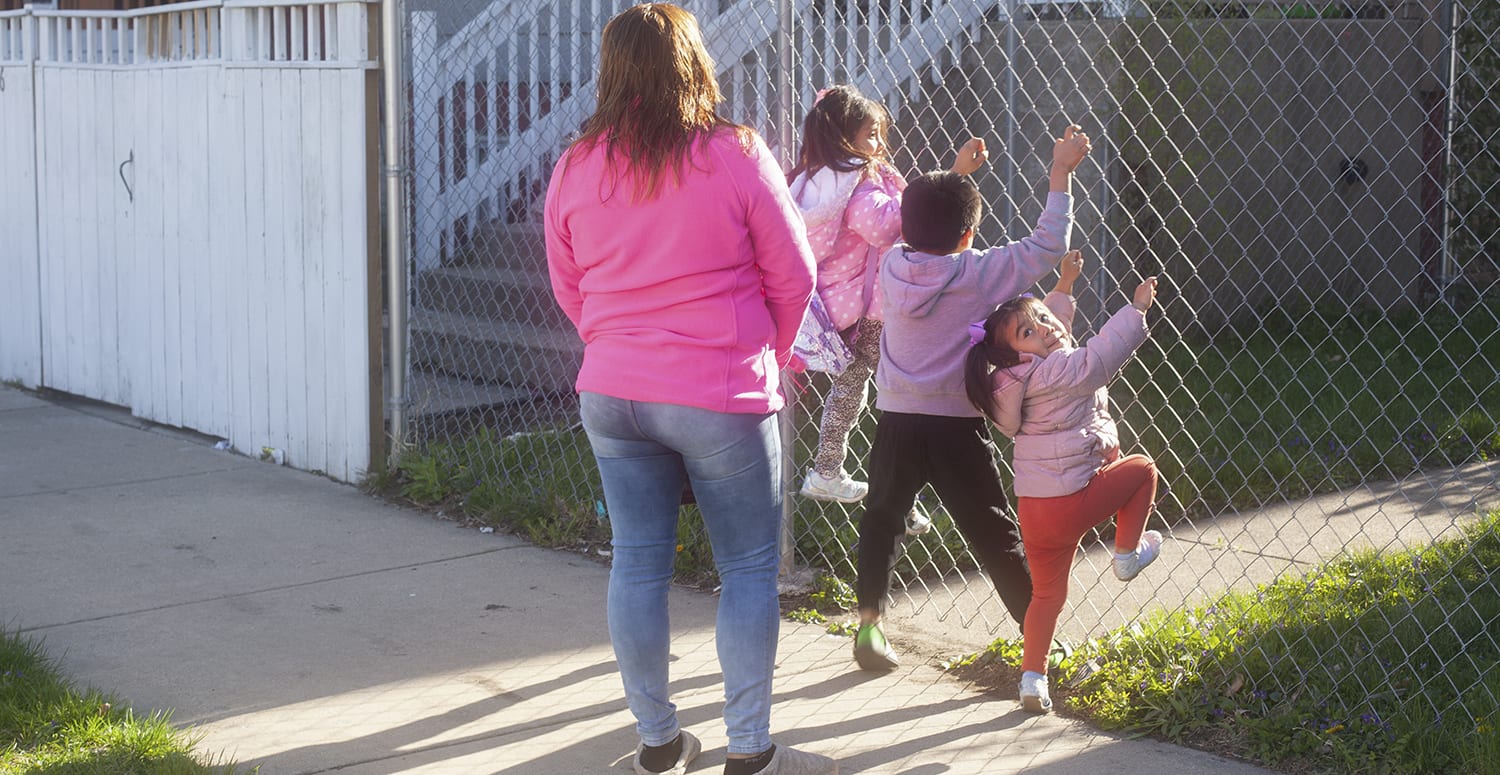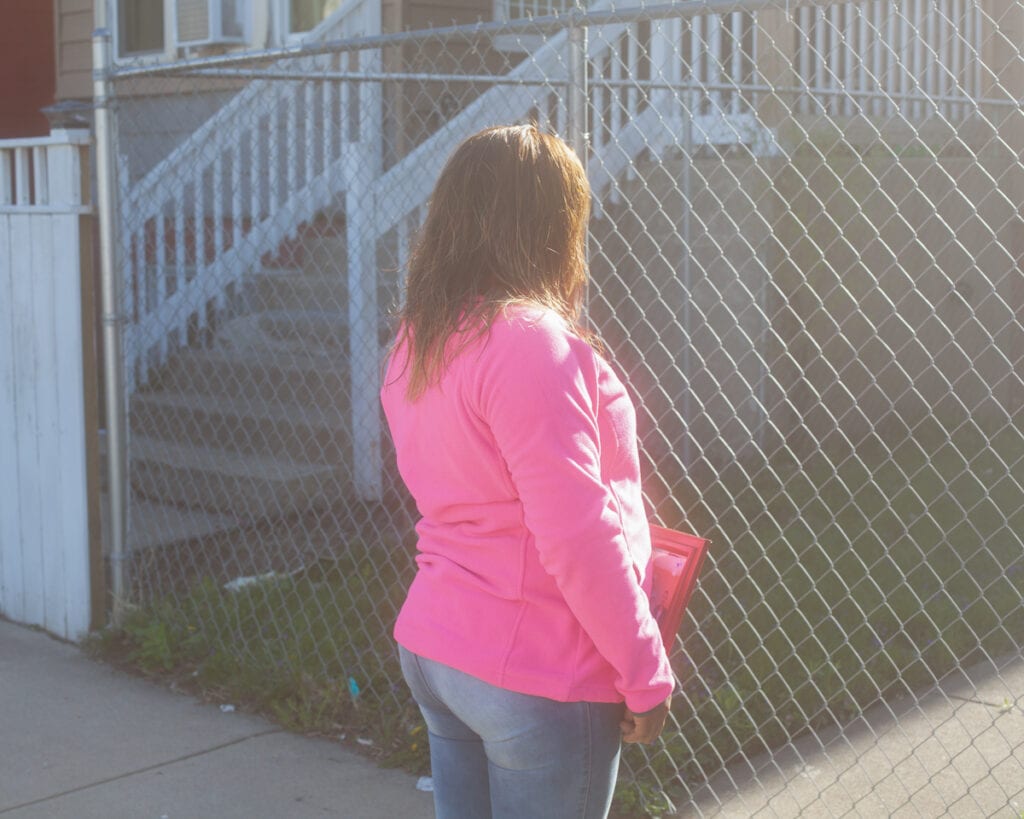 Photo by Samantha Cabrera Friend for Borderless/CatchLight Local
Photo by Samantha Cabrera Friend for Borderless/CatchLight LocalA Chicago mother explains how her husband’s 15-year-old conviction led to three deportations and a family torn apart.
This story is part of the collateral consequences series, a partnership between Injustice Watch and Borderless Magazine to explore the criminal conviction-to-deportation pipeline in Cook County. Leer en español.
In March, Elena* said U.S. Immigration and Customs Enforcement deported her husband, leaving her to care for their six children in Chicago amid the Covid-19 pandemic.
Elena shared the story with Injustice Watch and Borderless Magazine in response to our call to help investigate the aftermath of criminal convictions for noncitizens.
The trouble began in 2006, when Elena’s husband Sergio* lived in Utah, and police found a fake Social Security card inside his vehicle during a traffic stop, he said.
Sergio, who provided Injustice Watch and Borderless Magazine with details about his story from Mexico, remembers that a defense attorney advised him to plead guilty to using false documents to secure a quick release. But the attorney didn’t warn him that the conviction could become grounds for deportation, he said. At the end of his criminal case, ICE detained Sergio and deported him to Mexico.
Sergio returned to the U.S. the same year and moved to Chicago, where he met Elena, he said. But when federal immigration agents stopped a van that he was in during a 2017 sweep of construction workers in South Chicago, they discovered that he was in the country without documentation again, in violation of his first deportation order, and ICE deported him a second time, he said.
Sergio returned to Chicago in 2018 to reunite with his family. But in March, one day after Chicago police pulled him over in a traffic stop, ICE detained him again. Within a week, they had deported him to Mexico.
Because it was his third deportation in a decade-and-a-half, Elena said, immigration attorneys told her that he has few legal options for return.
She suspects that police tipped off immigration enforcement in violation of a Chicago ordinance that prohibits Chicago police from cooperating with ICE, regardless of a person’s criminal record. The Chicago Police Department did not respond to questions about Sergio’s case but told Injustice Watch and Borderless Magazine that it does not collaborate with ICE.
Elena is now the sole caretaker of her three children with Sergio and three from his previous marriage. In an interview with Injustice Watch reporter Rita Oceguera, she recounted the day when ICE detained her husband and described how her family has struggled since.
We were coming back home after he picked me up from work, and they stopped him because his headlights were low.
The police stopped him and handcuffed him. Our two youngest daughters, 4 and 2 years old, were in the car and saw the whole incident. Now, whenever they see police sirens, they panic.
It wasn’t until two Hispanic cops came to the scene and told the other two cops that he wasn’t doing anything bad that they took off the handcuffs. I explained to [one of the Hispanic cops] the girls adore their dad. The Hispanic cops then told the other two cops there were underage children in the car, and that was when they took off the handcuffs and let us go.
One of the Hispanic cops discreetly told me if my husband was stopped again, to give my information and not his. Maybe they were trying to warn me, but I didn’t understand.
The next day, [my husband] helped me put the children in the car for day care. We saw a few cars that looked suspicious near the house, but we thought it was normal.
It never crossed our mind that was the day ICE would take him.

Elena poses in front of the home she lives in with her six children on the South Side of Chicago, Ill., April 16, 2021. Samantha Cabrera Friend for Borderless Magazine/CatchLight Local
They waited until my husband got in a van with two other men for work. They stopped the van without a reason and took him.
I had barely crossed the stoplight near our home when one of the men who was with him called me and told me ICE took him. We went to the police station to see what had happened, but they told us the police couldn’t do anything.
More than anything, it seemed like an act of racism by the cops who stopped him. I don’t think they should have reported him because, supposedly, Chicago is a sanctuary. To have done that doesn’t seem fair.
I talked to different lawyers, but they said they couldn’t do anything because it was the third deportation.
I was able to talk to my husband after they took him but only for five minutes each time. On Monday, five days later, he called to tell me he was already in Mexico.
My husband and I were buying a home, but now I am left with all the bills. I get some [financial] help from the government. That is what is helping me right now.
When the pandemic began, they laid us off at the factory I worked in. I was going to look for work, but my husband said to stay with our children instead.
I was then offered an opportunity to do what I love, and I began working but without pay. A woman was teaching me how to do nails.
Now, I’m working again [cleaning homes], but they pay me very little — $350 a week. I start at 9 a.m., but I don’t have an end time because sometimes the houses we clean are very dirty, and we need to finish the job.
We think that my husband might not come back this time. He says he wants to be with his children. The only thing I want is someone to help me, so he can return with legal permission. Given the situation, I don’t know if it’s possible.
More than anything [I want him to return] for my kids. They love their dad. Since he has been taken, they have become very bad-tempered, and they don’t really pay attention to me. Our youngest daughter waits for him at the door, and now, for everything [she wants], she doesn’t talk, she screams. It’s like she’s carrying with her that her father is no longer here.
This article was produced in partnership with Report for America and The Chicago Reporter.
*Not their real names. Injustice Watch and Borderless Magazine agreed to use pseudonyms to protect the individuals in this story from potential legal repercussions.

